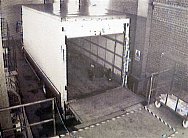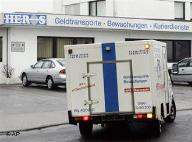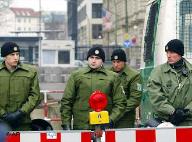Police arrest two but cash may already be overseas and far away
By Steve Bird, Will Pavia and Stewart Tendler
DETECTIVES hunting the armed gang responsible for stealing up to £50million in Britain’s biggest cash robbery have arrested two people, police confirmed last night.
 Senior officers described the arrests for conspiracy to commit robbery as “a significant breakthrough”. The suspects, a man aged 29 and a woman aged 31, were arrested separately in South London. The arrests came hours after insurers offered Britain’s biggest reward of £2 million.
Senior officers described the arrests for conspiracy to commit robbery as “a significant breakthrough”. The suspects, a man aged 29 and a woman aged 31, were arrested separately in South London. The arrests came hours after insurers offered Britain’s biggest reward of £2 million.Last night the couple, who have not been named, were being held at police stations in Kent as police searched two addresses in Forest Hill, South London.
Adrian Leppard, the assistant chief constable of Kent, said: “These arrests show our commitment to bring the members of this criminal gang to justice.” Mr Leppard said that the arrests were very positive and directly related to the investigation.
The woman was arrested as she tried to open a building society account with bundles of used notes wrapped with tape marked Tonbridge.
It is understood that the woman walked into the Portman Building Society in Bromley, Kent, and said that she wanted to make a large deposit. Staff, noticing that the £6,000 was bound with tape marked Tonbridge, kept her talking while they phoned the police.
Mr Leppard said that police had also discovered a red former Parcel Force van that might have been used during the kidnapping of the wife of the manager of the Securitas cash depot.
The van was abandoned in a car park at the Hook and Hatchet pub at Hucking, near Maidstone, but was linked to the raid only after police had interviewed the woman.
Timothy Clark, 44, the pub landlord, said that he suspected that the vehicle had been involved in the raid. “We are the only building in the vicinity and we couldn’t understand why the vehicle had been abandoned,” he added. Last night police said that so far none of the cash had been recovered and that it could have been smuggled across the Channel hours after the raid.
Speaking at a press conference before the arrests, Mr Leppard, who is leading a team of 100 investigators, confirmed that police were looking at the possibility that the gang had fled across the Channel. Officers have already seized security camera footage and computer numberplate records of vehicles going through the Channel Tunnel and on the Dover ferries after the raid early on Wednesday morning.
Mr Leppard also confirmed that detectives were looking into the possibility that the gang had inside information for an operation that had been “executed with military precision”.
He said that detectives were keeping an open mind about an insider at Securitas, whose depot in Tonbridge, Kent, was the robbers’ target, but said that the gang must have carried out “extensive reconnaissance”. There are about 60 staff at the depot. A special group of officers will already have begun checking their background, lifestyles, relatives and friends for any suspicious links.
 Police believe that the gang must have known that the depot would hold unusually large amounts of money after the January sales. They suspect that the leader may have decided to limit the haul so that their escape would not be delayed. Steel cages of cash were wheeled by raiders dressed in overalls and masks into a 7.5-tonne lorry before it was driven away. The lorry and three other vehicles used in the robbery have not been found.
Police believe that the gang must have known that the depot would hold unusually large amounts of money after the January sales. They suspect that the leader may have decided to limit the haul so that their escape would not be delayed. Steel cages of cash were wheeled by raiders dressed in overalls and masks into a 7.5-tonne lorry before it was driven away. The lorry and three other vehicles used in the robbery have not been found.Mr Leppard said that the loss “could be as high as forty or fifty million pounds”, but that the final figure would not be known until forensic scientists had finished their work and an audit had been completed.
Detectives disclosed yesterday the full extent of the ruthless tactics used by the robbers. Mr Leppard said that the gang were top-flight criminals and were “a serious organised criminal gang that is armed and extremely callous”. “They have taken hostage a young woman and her eight-year-old son and terrorised 14 members of staff. It was a meticulously planned operation and a lot of people were involved. If you are one of those people then please ring,” he said.
“This reward is being offered because we know that someone out there will have seen or heard information that could be vital to our investigation.
“It may be that people involved in crime know something and we would urge them to come forward. This is a significant reward that reflects the serious nature of this robbery.”
Colin Dixon, the manager who was forced to let the gang into the depot while his wife, Lynn, and his young son were held hostage, and the 14 staff who were seized, were still being questioned. Mr Leppard said that the boy had been traumatised by the ordeal.
Mr Dixon, who was threatened at gunpoint, was told that his child and wife would be “executed” unless he co-operated.
At 1am on Wednesday they were all taken to the depot, where the robbers, who were wearing balaclavas and paintball masks, tied up the staff and packed the cash into the lorry.
Police are in contact with their colleagues in Northern Ireland for advice on how they handled the raid on Northern Bank’s Belfast headquarters in 2004, in which £26.5 million cash was stolen.
Detectives have also appealed to the public for help in finding the manager’s silver Nissan Almera car, registration WP52 KPV, which they believe was left in the layby on the A249 near Stockbury and then removed by one of the gang. The disappearance of the vehicle raises the prospect that it has been burnt out to remove clues to the identity of the kidnappers.
timesonline.co.uk 02/2006






